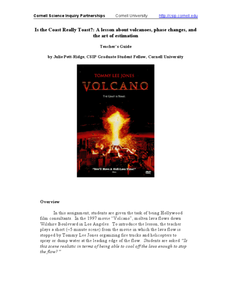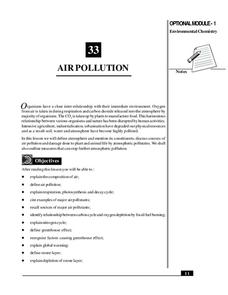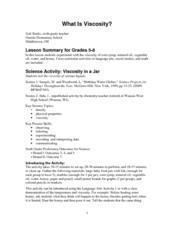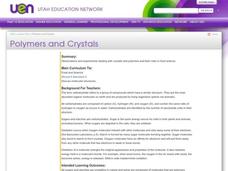Curated OER
Lipids: Fats and Oils
A fantastic presentation with great images should improve student understanding of lipids and their involvement in the body. The chemistry of different fats, phospholipids, and steroids are explained. Additionally, the specific uses,...
Exploratorium
Indicating Electrolysis
Sure, your learners know water is made up of two molecules, but watching them separate helps the class see the construction like never before. This resource provides directions on how to build a simple electrolysis device using a...
Space Awareness
Ocean Acidification
Learn the science behind ocean acidification and its effects on ocean wildlife. Young scientists conduct a laboratory investigation that monitors the acidity level of water. While burning a candle, learners capture the carbon dioxide in...
Curated OER
Towers of the Lost City
Middle school marine scientists compare the pH change in distilled and saltwater as acetic acid is added one drop at a time. Then they compare the pH change in both when sodium hydroxide is added. This experiment demonstrates the...
Curated OER
Is the Coast Really Toast?: A Lesson About Volcanoes, Phase Changes, and the Art of Estimation
Clever! Use a clip from the 1997 film, Volcano, to get your chemistry class knee-deep in heat concepts related to lava. In the movie scene, lava flow is stopped in the nick of time. Your class must use calculations to determine if this...
Curated OER
Lake Strata and Internal Waves
Use the classic density demonstration of placing a cola, a clear soda, and a diet soda into a tank of water. Then let learners attempt to pour some of the soda into layers in a clear container. The procedure explains a thermocline, and...
Curated OER
Version 001 - Quiz 1
The phase diagram tops this chemistry quiz. Junior scientists answer eight multiple-choice questions as they analyze it and make calculations regarding the heat of vaporization.
Teach Engineering
Exploring Capillary Action
Explore capillary action from different perspectives. In the fourth installment of a nine-part series, scholars perform several experiments to observe capillary action. They look at the meniscus of water in a glass, observe capillary...
National Institute of Open Schooling
Air Pollution
Seventy percent of the air pollution in China is due to car exhaust. Under the umbrella of environmental chemistry, learners extensively explore air pollution. From the makeup of our atmosphere to sources of major air pollutants, classes...
Curated OER
What Is Viscosity?
Students experiment with the visocosity of corn syrup, mineral oil, vegetable oil, water, and honey. They research viscosity before beginning. Pupils draw the conclusion that the marble sinks more slowly in the liquids with greater...
National Institute of Open Schooling
Solutions
Aqua regia, or royal water in Latin, is a solvent that can dissolve solid gold and platinum into a solution. Activity nine in a series of 36 allows classes to learn, through readings and answering questions, what a solution is and the...
Beyond Benign
Packed Up Properties
Determine physical properties of potential packaging materials. Continuing from previous lessons in the series, the resource asks groups to identify physical properties of the substances. They test for conductivity, solubility, water...
Curated OER
# 14 Experimenting with Copper (II) Solutions
Students determine that the relative concentration of copper ions in water can be determined by a color comparison. They make a copper (II) sulfate solution of a given concentration. Students dilute their initial solutions until their...
Curated OER
Investigating The Mysteries Of Third Grade
Third graders use logic and knowledge of mathematics facts to solve problems. They see that pigments can be broken down into separate colors. Pupils recognize the capacity of water to move upward and measure the height water travels up...
Curated OER
Color Burst
Fourth graders explore how colors react in water (chromatography) and other solvents. They observe, investigate, measure, record data and communicate their results in the form of graphs/charts and narration presented to the class....
Curated OER
Melting and Freezing Behavior
Students investigate melting and freezing behavior in substances. For this melting and freezing points lesson plan, students perform experiments to test the impact of various salts on the freezing point of water, they test the impact of...
Curated OER
WS 1.7 Density /Archimedes Principle
Archimedes' principle is practiced as chemistry learners practice computing the density of different gases, liquids, and solids. Using a chart of standard densities, they also identify unknown materials by similar calculations. Fifteen...
Curated OER
Silica Tetrahedron Model
Very simply, pairs of learners construct a model of the tetrahedral silica structure using raisins and toothpicks. They dip it into a soapy solution and then blow a bubble "atom" into its center. The lesson plan gives instructions that...
It's About Time
States of Matter: Solid, Liquid, and Gas
Solid, liquid, and gas: they all matter. Scholars create an animation of the various states of matter, experiment with the temperature of water as it changes states, and observe carbon dioxide as it changes states. The lesson also...
Mr. E. Science
Chemical Reactions
Once I told a chemistry joke, but there was no reaction. Get young chemists involved in changes and reactions with a presentation that begins with physical and chemical changes and chemical reactions. It moves on to chemical equations...
Biology Junction
Macromolecules
In chemistry, organic means something contains a carbon base. A helpful presentation starts by defining macromolecules as large organic carbon molecules. Scholars answer questions about each topic on the associated worksheet. It covers...
Curated OER
Polymers and Crystals: Their Role in Food Science
Blend chemistry with cooking in this exploration of polymers, carbohydrates, and food science. Experimenting with gelatin produces concrete examples of the bonding and ploymerization discussed in the lesson. Copious, comprehensive...
Curated OER
Semipermeable Membranes and Bioaccumulation
Beginning biologists place a drop of food coloring into water of differing temperatures to observe the effect on the diffusion rate. They remove the shells from raw eggs and then experiment with osmosis over the remaining membranes....
Curated OER
Chapter 2 and 3 Practice Worksheet - Formulas and Compounds
In this formulas and equations activity, chemistry apprentices write the chemical formulas given the names. They calculate percent composition, balance equations, and calculate the mass of a substance present in a fertilizer. This is a...
Other popular searches
- Water Chemistry
- Lake Water Chemistry
- Water Chemistry Ions
- Co2 Water Chemistry
- Water Chemistry Lesson Plans
- Ocean Water Chemistry
- Basic Water Chemistry
- Water Chemistry Properties
- Storm Water Chemistry
- Marine Water Chemistry
- Size vs. Water Chemistry
- Water Chemistry Nitrate

























